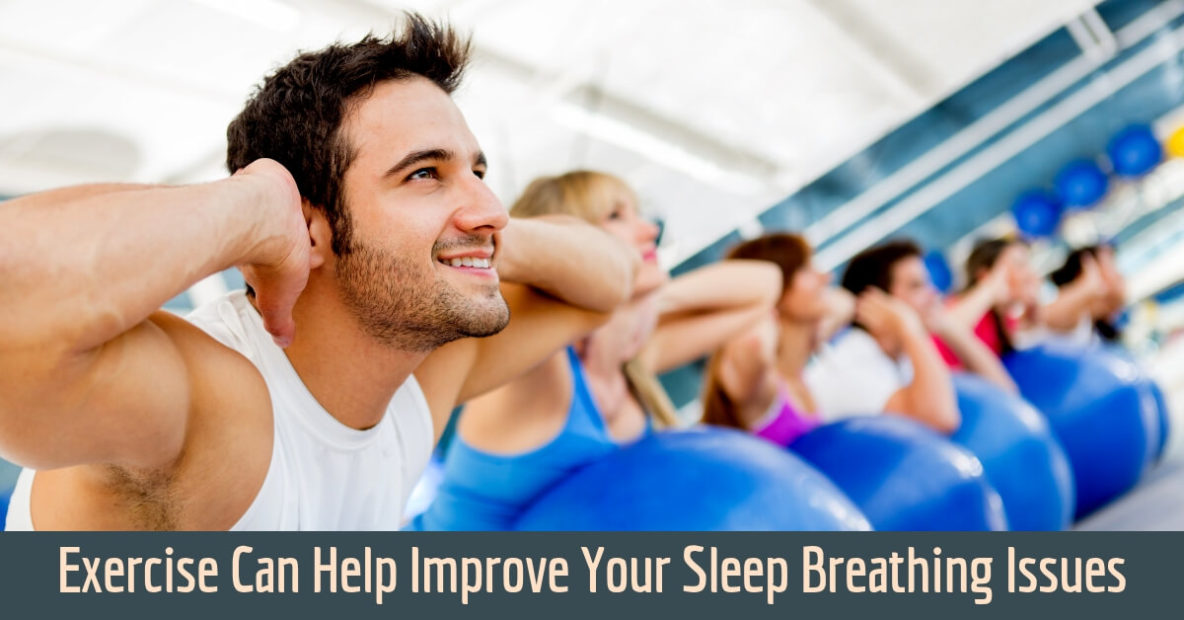Exercise Can Help Improve Your Sleep Breathing Issues

- A Promising Paradigm Shift: New Research Challenges the CPAP-First Approach to OSA Treatment - September 5, 2023
- Understanding Sleep Meditation Techniques - July 30, 2021
- How Online Learning Has Affected Sleep for Students - July 13, 2021
Have you been having trouble breathing at night? Do you wake up in the night feeling short of breath, or gasping for air? If you’ve been struggling with sleep breathing issues, exercise could be the answer to breathing deeply, reducing daytime drowsiness, and getting a good night’s rest.
Physical Activity and Sleep
Several recent studies have looked at the links between physical activity and sleep. They found that people who are more physically active during the day have better sleep at night when compared to those with a more sedentary lifestyle. They’re more likely to fall asleep easily, sleep longer, and enjoy more deep sleep than those who spend a lot of time sitting during the day. Exercise can also minimize some of the effects of sleep apnea by helping you breathe more easily at night.
Those who exercise spend more time in deep sleep, which improves memory and learning, and they wake up feeling more refreshed and energized in the morning. “The people who do more physical activity during the day, those with the highest energy expenditure, are those who sleep better,” explains researcher Rebecca Robillard, a neuropsychologist at the Center for Advanced Research in Sleep Medicine at the University of Montreal in Canada.
What is Sleep Apnea?
Sleep apnea is a sleep disorder that makes it difficult for you to breathe while sleeping. When you fall asleep, the muscles in your neck and throat relax, causing your airway to close or collapse. Oxygen flow will stop, and your partner might notice that you seem to stop breathing for a few seconds at a time. When your brain realizes that you aren’t breathing, you’ll wake up for a split second, tensing the muscles and opening the airway. This can happen hundreds of times in a night, and prevent you from resting.
Signs of sleep apnea include fatigue and trouble concentrating. Those with sleep apnea are often easily irritable, and can suffer from mood swings. Even if you’re in bed for 9 hours, you’ll get up feeling groggy and tried because you haven’t had enough quality sleep. Sleep apnea has been linked to greater risk of workplace and motor vehicle accidents, cardiovascular problems, increased risk of stroke or heart attack, high blood pressure, depression, and dementia.
How Exercise Can Help
If you’re struggling with sleep apnea, an exercise program can help you sleep more. It’s recommended that you walk every day, and do weight training a couple times a week. This has been shown to reduce the severity of sleep apnea symptoms by 25%! According to Christopher Kline, PhD and postdoctoral scholar in the department of psychiatry at the University of Pittsburgh School of Sleep Medicine, “The most compelling point of the research was that this 25% reduction was achieved without any reduction in body weight.” Kline ran a three-month study in which adults with sleep apnea exercised regularly, including walking and resistance training.
At the end of the three-month period, they woke up far fewer times in the night, and had less trouble breathing during the night. Exercise also reduces daytime sleepiness and fatigue, and helps you focus on tasks. Sleep apnea can be treated in a number of different ways, and taking a close look at your diet, lifestyle, and exercise routine are all ways to improve your sleep breathing issues.
Treating Sleep Apnea
While the study’s authors promote exercise as a way to manage sleep apnea, they stress the importance of treating sleep apnea with medical therapies and interventions. One of the best treatment options for sleep apnea is a continuous positive airway pressure (CPAP) machine, a device that maintains a low airflow through your airways, keeping them open throughout the night and eliminating sleep apnea, allowing you to get a good night’s sleep every night. Oral appliance therapy is a great alternative for those who do not wish to use a CPAP machine. This treatment method uses a sort of “sleep apnea mouth guard” to keep the airway open during sleep.
Sound Sleep Medical
If you’ve been struggling to sleep at night, or think you might be suffering from sleep apnea or some other sleep disorder, visit us today at Sound Sleep Medical. Our team of specialists will help you discover the cause of your sleep disturbances, suggest lifestyle changes that could help you breathe better at night, and work with you to find the perfect treatment method. We also have the best CPAP alternatives that are easy to use and will make sure you’re getting the sleep you need.
